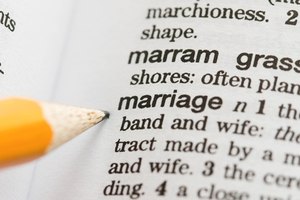Questions for Divorce Interviews
By August Jackson J.D.

marriage defined image by Christopher Walker from Fotolia.com
A person seeking a divorce needs to hire a divorce attorney. The client interview lasts for about an hour. During that time, the attorney will ask you many questions concerning the marriage and the property acquired during the marriage. The following questions should give an idea of the type of questions that will be asked during the client interview and the information a divorce client needs to have on hand during the interview.
Contact Information
The attorney will ask your name, your home telephone number, your work telephone number and your cell phone number. The attorney may need to contact you after you have left her office. She may need to ask questions and set up subsequent meetings. The attorney will also ask for your home address and the home address of your spouse. The attorney will use your address to send correspondence through the mail. The attorney will use your spouse’s address to have him served at his home if he has not hired an attorney of his own. The home addresses of you and your spouse are also important in determining which court will handle your divorce case.
Details of the Marriage
The attorney will ask on what date you were married and in which city and state you were married. You should provide the attorney with a copy of your marriage license. The attorney will include this information in your divorce petition. Of particular importance will be whether or not you have children. If you do have children, the attorney will need to know whether the children are minors and if there will be any question of who will gain custody of the children. If you do have minor children, the attorney will spell this out in your divorce petition and include any custody requests in the petition, as well.
Property
The attorney will also ask about any property that you or your spouse own. Property obtained during the marriage may be divided equitably among the two parties or in half, depending on the state in which you reside. If you either of you owned property before entering the marriage or received a gift during the marriage, generally you will be able to keep that property. If, however, one of you owned property before the marriage, and the other improved on that property, then your attorney may ask that the piece of property be divided equitably among the two parties. For example, if your husband owned a house before marriage, and during the marriage you contributed to adding more rooms onto the house, your attorney can ask for the equivalent of the equity you have paid into the house.
Writer Bio
August Jackson is a contributor to various websites. She has taken courses in copywriting and has worked in corporate America as a proofreader. Jackson holds a Bachelor of Arts in English and a Juris Doctor with an emphasis in bankruptcy law.